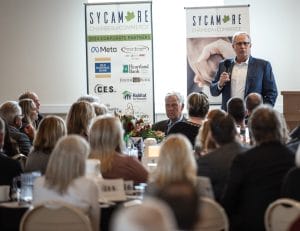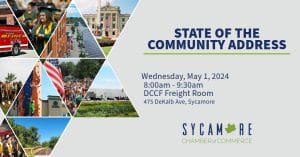Business Advocacy: We believe in commerce.
We are your fearless advocate for business interests with local, county, state, and national government.
The mission of the Business Advocacy Committee is to advocate for a strong and healthy business environment through influencing of legislative, economic and social policy. The Business Advocacy Committee brings together sectors of the business community to serve as one voice for business. All advocacy efforts made by the Chamber’s Business Advocacy Committee are founded on encouraging business growth, promoting a strong local economy and fostering a favorable business climate in Sycamore and DeKalb County.
2024 Business Advocacy Committee
Through our advocacy efforts, we are both a calming stabilizer and a passionate advocator.
- Robert Heck, FNBO – Chair
- Bob Hammon, Kishwaukee College Board of Trustee
- Alan Zantout, Ideal Industries
- Chase Goodeill, Pest Control Consultants
- Jill Mandeville, Blumen Gardens
- Rick Turner, Turner Law Group
- Chad Jewett, CMJ IT
- RoseMarie Treml, Sycamore Chamber of Commerce
If there is an issue that you would like us to review complete this form, email it to the chamber, or call us at 815-895-3456.
2024
~ Chamber hosts Legislative Business Briefing with State Representative Jeff Keicher and State Senator Dave Syverson
On July 17, the members of the Sycamore Chamber had a unique opportunity to engage with their elected officials, State Representative Jeff Keicher and Illinois State Senator Dave Syverson. During the event, attendees received valuable insights into policy updates and laws directly impacting their businesses. A wide range of topics relevant to our business community, providing clarity and perspective on legislative matters were discussed. Additionally, guests had the chance to ask questions and engage in meaningful dialogue, fostering a dynamic exchange of ideas and concerns.
~ Chamber opposes and implores State Legislators to reject H.B. 5345
This Bill would fundamentally alter the way restaurants, bars, breweries, hotels, and other businesses that use the tip credit to pay their employees, causing many to cut shifts or tipped staff positions, raise prices, or permanently close. Eliminating the tip credit is not a raise for tipped employees. Employers who use the tip credit are already required by law to pay the difference if the tipped wage and their tips don’t add up to at least minimum wage. In fact, tipped workers have higher earning potential in the current system than they would if the tip credit were eliminated. For instance, according to National Restaurant Association Research, the median tipped restaurant worker in Illinois currently earns $28.48 per hour, far above current minimum wage. This is why 87% of Illinois tipped restaurant employees agree that the current system works and does not need to be changed.
Our local businesses are already facing significant economic challenges and would bear the brunt of this policy. Restaurants, bars, breweries, hotels, and other businesses who use the tip credit would be forced to pass the increased cost on to consumers to try to make ends meet, and many would still need to make severe cutbacks or potentially close. As a Chamber of Commerce, we want to protect our small businesses and their employees. We implore our local legislators to reject H.B. 5345, the flawed proposal to eliminate the tip credit. Instead, let’s work together to do the right thing to protect Illinois businesses.
~ Chamber supports the City of Sycamore’s Application for Community Project Funding Grant for New Fire Station
The Sycamore Chamber of Commerce, along with the Sycamore Park District, and the Sycamore School CUSD #427, wrote a letter of support for the City of Sycamore’s Community Project Funding Program Grant Application, from Representative Lauren Underwood’s office.
~ Chamber supports the Sycamore Beautification Committee’s application for a Hometown Grant from T-Mobile.
The Sycamore Chamber of Commerce strongly believes that supporting this grant application is not just an investment in physical infrastructure but a testament to our collective commitment to building a stronger, more connected, and vibrant community. We urge the Grant committee to consider the immense benefits that these projects will bring to our community, its residents, and our businesses. Together, we can create spaces that inspire, unite, and empower all of us.
2023
~ Navigating the Impact of the SAFE-T Act and It’s Impact on Our Business Community
On September 13, the Sycamore Chamber of Commerce Business Advocacy Committee welcomed DeKalb County State’s Attorney Rick Amato, Chief Judge Bradly Waller, DeKalb County Sheriff Andy Sullivan, and Police Chief Jim Winters to discuss the SAFE-T Act, particularly the elimination of cash bail, which became effective September 18th, 2023.
~ Chamber encourages Council approval of Special Use Permit for BCM Industrial Park LLC
The Sycamore Chamber of Commerce, on behalf of Discover Sycamore, the City’s designated tourism entity for over 23 years, our Executive Team, Board of Directors, fully support the approval for the Special Use permit for BCM Industrial Park, LLC. to redevelop former Sycamore Business Park. We believe the repurposing of a small portion of this once thriving industrial complex will generate untold economic impact for Sycamore, while bringing in tax revenue and abundant employment opportunities for our community. This project re-imagines and gives rebirth to this iconic historical industrial complex that has become unusable in its present condition and continues to be an attractive nuisance.
~ Letter of support for Sycamore Park District’s application for OSLAD Grant
On behalf of the Sycamore Chamber of Commerce please accept this letter of support for the Sycamore Park District’s application for the OSLAD Grant to support creating a community park for Sycamore’s North Grove community. This grant will allow the Sycamore Park District to establish a park with diverse recreation amenities and resilient native plantings in the heart of a residential community, where no public parks are provided. The core of this project is blending much needed active and passive recreational amenities with crucial native upland prairie habitats that will bolster the local ecosystems.
2022
The Illinois General Assembly adjourned well after midnight, on Friday, April 8th, ending a very abbreviated session. As you recall, several weeks of sessions were canceled in January/early February due to the rise in COVID-omicron variant cases. Normally the session ends in late May, but the session was shortened to allow elected officials in the June primary races to campaign in their local communities.
Here is a short recap of the outcomes of the bills in which we were advocating this General Assembly:
~ Replenishing of the Unemployment Insurance Trust Fund:
The General Assembly voted to allocate $2.7 billion of American Rescue Plan Act (ARPA) funds to the Unemployment Insurance Trust fund (UI), $1.8 shy of what we were advocating for to prevent tremendously escalating unemployment insurance rates for businesses. ARPA is the latest federal stimulus bill to aid public health and economic recovery from the COVID-19 pandemic. The UI Trust fund is the pool of funds used to fund unemployment payments. This fund was depleted during the pandemic due to forced business shutdowns and fraudulent claims. There is a slight chance of re-negotiation in the fall but more likely January 2023 will be our next opportunity to work on increasing the ARPA allocation.
~ Extend the EDGE Tax Credit (Economic Development for a Growing Economy):
These are credits awarded per job created by the calendar year. The General Assembly agreed to extend this program for another five years helping IL stay competitive with neighboring states.
2021
~ Hotel, Restaurants, and Tavern Grants:
The General Assembly allocated ARPA dollars for grants to support these industries. Restaurants and taverns could be eligible for one-time grants up to $50,000. One-time grants to hotels would be up to $1,500 per hotel room.
~ Restructure the Minimum Wage Credit’s incremental phase-out (HB5320):
We were encouraged to have Representative Janet Yang Rohr sign on as a sponsor of this bill and Representative Amy Grant was an initial sponsor. The hope was to have this bill pass to allow small businesses to capture the original intent of the credit, however, it did not pass this session. We will continue to work on this issue to extend this credit to 25% for the next three years.
2020
Letter to Governor asking for relief from the restrictions on our Small Businesses
On behalf of our membership the Sycamore Chamber wrote a letter to Governor Pritzker imploring him to remove current restrictions on small businesses that have been hit hardest by the recent mitigations that were imposed on Oct. 3. Click here to see letter to Governor Pritzker Oct 2020
Sycamore Chamber Joins 43 Illinois Business Organizations and Chambers of Commerce in Opposition to the Proposed Illinois Graduated Tax Amendment
In support of our families in our community, local small businesses, and major employers, the Sycamore Chamber of Commerce urges you to vote NO on November 3 for the graduated income tax constitutional amendment.
Often, we hear the graduated income tax referred to as the “fair tax” – where higher-income earners would pay a higher tax rate. Data negates this and shows that the two highest tiers of income earners – $100,001-$500,000 and $500,001+ respectively at our current fixed income tax rate contribute 67% of our state’s income tax revenues, yet these top tiers represent only 20% of all the income earners in the state of Illinois – according to the Illinois Department of Revenue. Furthermore, proponents of moving to a graduated income tax are fueled by relief for lower-income households which are minimal from the estimates that I have seen and could change year to year based on what the general assembly decides to set for the tax rate for any given year. If the true intent is to support lower-income families, creating tax credits for these families would ensure the intended results. We don’t need to open pandora’s box of a blank check to our state government under the guise of supporting low-income families and losing key tax protections for businesses.
There are two key tax payer protections in the current constitutional amendment that would be lost under the graduated income tax proposal that would significantly impact the business community:
- The state can only levy one tax-based income – if removed, industries would be vulnerable to double taxing based on the whelm of future general assemblies to gain additional tax revenues
- The state is capped on the tax rate it can impose or levy on corporations
Illinois currently has the 4th highest corporate tax rates in the country. If these two protections are lost by the adoption of the graduated income tax, business retention and attraction efforts will be diminished. The neighboring states of Indiana, Iowa, Kentucky, and Missouri have all cut corporate income taxes in recent years, while Illinois is proposing the opposite course.* Business investment creates jobs and spur all aspects of the economy.
Below is the actual wording of this referendum you will see on your ballot:
“The proposed amendment grants the State authority to impose higher income tax rates on higher income levels, which is how the federal government and a majority of other states do it. The amendment would remove the portion of the Revenue Article of the Illinois Constitution that is sometimes referred to as the “flat tax,” that requires all taxes on income to be at the same rate. The amendment does not itself change tax rates. It gives the State the ability to impose higher tax rates on those with higher income levels and lower income tax rates on those with middle or lower income levels. You are asked to decide whether the proposed amendment should become a part of the Illinois Constitution.” ___Yes ____No
Click here to see Sycamore Chamber’s press release on the proposed graduated tax amendment
PAST ISSUES
2019 – The Sycamore Chamber took an official stance opposing the House Bill 2749 which amends the Minimum Wage Law. It provides that the overtime requirements of the Law do not apply to an employee in a bona fide executive, administrative, or professional capacity as defined by or covered by the federal Fair Labor Standards Act of 1938 but compensated at a salary greater than $47,476 per year or the weekly/monthly portion thereof or a greater salary as may be adopted by USDOL. Provides that the amount shall increase annually by the percentage increase in the Consumer Price Index. Effective Immediately.
Along with the Illinois Chamber we oppose this bill for the following reasons:
- The proposed change to the salary level has a disproportionate adverse effect on employers located in lower-wage areas and harms the career growth of mid-level employees—the difference in the cost of living between Chicago, Springfield, and other cities directly impacts an employee’s wages. While $47,476 may be an average administrative salary in Chicago, a salary around $35,000 in Springfield may be the average.
- Few employers have the budget flexibility to increase the wages paid to employees under the proposed increase in the minimum salary level. Many employers will have to choose among the three unpalatable options:
- The employer will need to lay off employees to fund the increase in wages for retained employees. This will necessitate curtailing aspects of their operations and/or increasing the workload of the remaining exempt workforce.
- In order to maintain payroll budgets, employers will need to lower the hourly wages of non-exempt employees to remain at the prior year’s level. This will have a negative impact on employee morale, and place smaller employers at a disadvantage in competing with larger employers for qualified candidates
- The employer will need to adopt a firm restriction on the overtime hours worked by non-exempt employees, relying on temporary or part-time staff for additional personnel resources at straight-time rates, or forcing exempt employees to absorb some of their non-exempt colleagues’ duties.
- The growing opportunity for more flexible work hours such as allowing employees to work from home given cellphones, tablets, internet connections, etc. will be turned upside down, and employers will be required to vigorously regulate and oversee their employee’s business use of such devices away from the workplace. Employees enjoying such flexibility may see it eliminated or dramatically curtailed.
We respectfully urge a NO vote.
2017 – We held a Candidates Night for the community to hear from the three Mayoral Candidates. Over 200 attended. We accepted questions from the audience and from our membership prior to that evening. Also gave other county and municipal candidates and opportunity to meet and greet with those in attendance.
2016 – The Sycamore Chamber took an official stance opposing the County School Facility Occupation Tax. The DeKalb School District and four other districts in DeKalb County are pursuing a 1 percent sales tax increase in the form of a County School Facility Occupation Tax. The Chamber feels strongly that this would have an adverse affect on our local economy. Position Statement in Opposition to County School Facility Occupation Tax 2016
2016 – The Sycamore Chamber wrote a letter supporting the Sycamore Park District’s Grant Application to the Illinois Department of Transportation for their Trail Project.
2016 – Committee met and discussed the one percent sales tax increase, a County School Facility Occupation Tax, that the DeKalb School District is likely going to pursue. Also attended an informational meeting hosted by the DeKalb School District regarding the issue. Those in attendance heard a presentation from Ann Noble with Stifel Nicolaus Financial Consulting and it was followed by a question and answer session. It was determined that an additional meeting had to be scheduled to clarify the exact net dollar amount that this tax would produce.
2016 – Committee met with DeKalb County Building & Development Association Representatives and the Sycamore City Manager, Brian Gregory to discuss and review Sycamore’s Impact and Connection Fees. It was determined that there was no need for the Chamber to take a position at this point.
2016 – Participated in a planning workshop with the Sycamore City Council and Planning Commission to discuss the annexation and rezoning of the Northwest Sub Area Plan and the corresponding regulations outlined in the Unified Development Ordinance.
2015 – Appointed to Mayor’s Ad Hoc Committee on Growth Management. Discussions focused on Connection Fees, Land Cash Ordinances and Impact Fees.
2015 – Participated in discussions facilitated by Lt. Governor Evelyn Sanguinetti, Robert Pritchard, Senator Dave Syverson, and Representative Tom Demmer about government consolidation and unfunded mandates.
The Lt. Governor was appointed to lead a task force under the Governor’s Executive Order 15-15 to find ways for the state to consolidate its more than 7,000 units of local government thereby reducing duplication and mismanagement, and improving operating efficiencies. Illinois has the highest local government taxes in the nation, including the 10th highest sales tax and 2nd highest property taxes.
The state currently imposes more than 280 unfunded mandates at a cost to local communities in the billions of dollars. However, not all mandates are undesirable; for example some can save taxpayers money and improve safety while others provide citizens with information so they can be more engaged in their government.
2014 – The Committee met with State Representative Bob Pritchard and Sycamore School District Officials to discuss the DeKalb County School Occupation Sales Tax. Area school superintendents said they have discussed the possibility of a countywide sales tax for school facilities, but say school board members have not shown interest in bringing the measure to voters. We will keep an eye on this issue.
2014 – The Committee has with State Representative Bob Pritchard and Sycamore School District Officials to discuss Senate Bill 16 (SB16). This bill will make sweeping changes in how the state funds education. SB16 does not increase the level of education funding, but changes the way in which limited state funding is apportioned among school districts. The Illinois State Board of Education has calculated the amount each school district would receive next year if SB16, as written, becomes law. District 427 would lose $591,803 per year. This loss of state funds is on top of the $3.2 million dollars that our school district has lost over the last four years due to funds being pro-rated. Will meet again in 2015 to discuss a possibly taking a position.
2014 – As the voice for our business community and as reinforced by our recent member survey, we oppose raising the minimum wage to $10 an hour. We wrote a letter to the Governor and our State Legislators opposing the increase, and asking them to do the same.
Our small businesses cannot afford to have the highest minimum wage in the nation. One of the serious consequences of raising the minimum wage is that our local business owners, saddled with a higher cost of labor, will need to cut costs, or pass the increase to their consumers in order to make ends meet. Many of the businesses that pay their workers minimum wage operate on extremely tight profit margins, with any increase in the cost of labor threatening this delicate balance.
Increases in the minimum wage fall disproportionately on small businesses who are the least able to absorb dramatic increase in labor costs. Business owners are already dealing with the relatively high costs of doing business in Illinois, such as workers’ compensation costs and unemployment insurance costs, and uncertainty about the impact of the Affordable Care Act. There are only so many dollars to go around and this can worsen an already adverse business environment in which employer’s bare costs that are stifling their ability to grow and create jobs.
The Sycamore Chamber of Commerce, representing 500 businesses in DeKalb County urges you to oppose the minimum wage increase. We urge you to vote no, stop the minimum wage hike and show our member businesses that you support a positive environment for business in Illinois.
2012 – March — The Chamber Executive Director attended a City Council Meeting and spoke on behalf of its 500 plus Businesses. The Chamber supported the City’s plan for the 100 Block of West Exchange Street to be kept open for two way traffic when the Courthouse expansion is complete. It was voted on and passed with a 5 to 3 vote that evening.
2012 – August – Sycamore Chamber sends letter to Governor Pat Quinn requesting him to veto the Leucadia Bill, SB 3766.
At a time when natural gas prices are dropping, this bill would force Nicor Gas and Ameren customers to pay more than triple the current gas rates to cover the construction and operation of a $3 billion “clean coal” plant in Chicago. One analysis found that the measure would slam Illinois consumers and businesses with $2.4 billion in higher rates over the first decade alone.
Our local businesses are constantly being challenged by increased costs, decreasing revenue and the ever present threat of higher state and local taxes. If this bill passes in its current form it will undoubtedly create even more burden for many businesses in the form of higher energy costs. The perception that Illinois State Government has imposed yet another obstacle to our local employers will further inhibit their ability to grow and employ the jobless. This will be difficult to overcome with only the prospect of promised short term construction jobs. Furthermore the known costs and mechanism for subsidy place too great a burden with too few and yet many uncertain benefits, on not just the state’s businesses, but all ratepayers and the citizens of Illinois. We respectfully ask him to evaluate the claims of Leucadia supporters based on the known facts and to weigh their merit. We ask Governor Quinn to show the businesses of Illinois, including our 450 Chamber members, that Illinois supports a positive environment for business.Governor vetos bill!
2011 – October – Sycamore Chamber again opposes Tanaska Bill, SB 2488, and sends letter to Senator Christine Johnson requesting a no vote. Bill defeated in Springfield.
– Chamber opposes Tanaska Bill, sends letter to Senator Brad Burzinski requesting a no vote. Bill defeated in Springfield!
2011- The Chamber opposes the 1/2 % home rule tax increase proposed by Sycamore City Council.
2011 – Healthy Families Act – Requires certain employers, who employ 15 or more employees for each working day during 20 or more workweeks a year, to provide a minimum paid sick leave of: (1) seven days annually for those who work at least 30 hours per week; and (2) a prorated annual amount for those who work less than 30 but at least 20 hours a week, or less than 1,500 but at least 1,000 hours per year.
2011 – HEALTHCARE ADVOCACY COMMITTEE CREATED – The mission of the Healthcare Committee is to develop and take actions to achieve affordable, accessible, efficient, high quality healthcare for the employers and residents of the Sycamore area. The Committee represents Chamber Member employers in seeking market-based approaches to help them provide affordable, quality healthcare coverage for their employees and works closely with provider to help strengthen our healthcare system.





